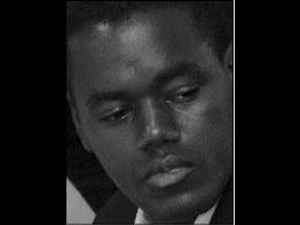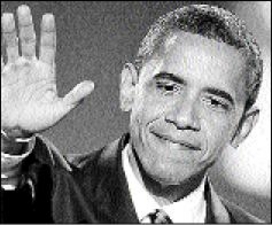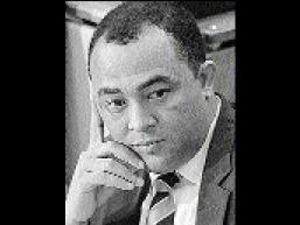


Waite, Obama and Tufton
SINCE 2000 when the controversial George W. Bush/Al Gore election had the world on edge, Lanarda Morris has been fascinated by the electoral process in the United States of America (USA).
On Tuesday that fascination went up a notch with the election of 47-year-old Barack Obama as the first black president of the USA.
She pondered: "Could a person that young be elected Jamaican prime minister?"
"If you have a Jamaican Obama, it would inspire more young people to get involved in the process. As things are now, I don't see that happening anytime soon," Morris, 26, told The Sunday Gleaner.
Obama is the fourth youngest person elected US president (Theodore Roosevelt, John F. Kennedy and Bill Clinton were younger). His landslide victory over Republican John McCain was driven by an enthusiastic youth vote.
Jamaican politicians
Morris, who is reading for an MBA in business administration at the University of the West Indies, has never voted. Like many of her peers, she says the message of Jamaican politicians has never been strong enough to get her to the polls.
Opposition senator Basil Waite has also been struck by the Obama phenomenon and how the Illinois legislator appealed to American college students and young professionals. Waite, 32, believes until there is a change in Jamaica's political culture, it will be some time before there is a young prime minister in this country.
"We do not place a lot of premium on young people in Jamaica; if you don't have a few grey hairs, people don't feel you are capable," Waite said.
power of your ideas
"What Barack Obama has proven is that it's not about your length of years, it's about the power of your ideas."
The leaders of Jamaica's two major political parties - the Jamaica Labour Party and the People's National Party - are selected to run for prime minister. In most cases, their successors are elected to the post.
The last three Jamaican prime ministers - P. J. Patterson, Portia Simpson Miller and Bruce Golding - got the job in their late 50s. Only two persons, Hugh Shearer, who was 44 when he took office in 1967 and Michael Manley, who was 48 in 1972, were under 50 when they became Jamaica's prime minister.
Lanarda Morris believes because the JLP and PNP have never committed to term limits for their leaders, it is even harder for persons like Basil Waite to get an early crack at prime minister.
"In the US, anyone can qualify (to run for president) once they meet the requirements. Here, it's like you have to be part of the status quo,"she said.
At 40, Agriculture minister Christopher Tufton is one of the youngest members of prime minister Bruce Golding's Cabinet. Back when he and Golding were members of the National Democratic Movement, they aggressively championed term limits for prime minister and party leaders.
Tufton told The Sunday Gleaner that he still holds that position.
"It facilitates renewal, motivates effort within the party and inspires persons to aspire to leadership," he said.
Tufton noted that while countries such as Russia and Georgia have presidents in their early 40s, it is unfair to compare their situation with Jamaica's.
first-world status
"We are a very young democracy and things take time to evolve. You've got to remember that one time you had to be 60 or more to become leaders in those countries," he said.
There has been hint of a change in the Caribbean. Bharrat Jagdeo became Guyana's president in 1999 at age 35; Roosevelt Skerritt was only 32 when he took over as Dominica's prime minister in 2004.
Basil Waite says his focus is on helping to develop Jamaica to first-world status, not necessarily to become prime minister. He is looking out for a leader with an inspirational message like Barack Obama.
"I'm hopeful that the day will come when Jamaicans will experience something like what happened in the United States a few days ago," he said.
A victory worth remembering
Mark Beckford
Sunday Gleaner Writer
NOVEMBER 4, the election of Barack Obama as the first African-American president of the United States of America has become a momentous date in history for many persons across the world.
Much has been written and spoken since then about the significance of the moment when the American electorate made a leap in electing Obama - the son of a Kenyan man and a white American woman - as their next president.
Obama, the Democratic candidate defeated Republican candidate John McCain by 364 electoral college votes to McCain's 162 votes. In the process Obama flipped many states consi-dered hard-core Republican, with the latest addition on Thursday being North Carolina which had not voted for the Democratic Party since 1976.
In the lead-up to election day, while not the main issue, much was made about some whites bringing themselves to vote for an African-American to be their president.
However, for many, the victory has been poignant for a number of reasons.
Brad Johnson, a White American from the state of Illinois which voted for Obama, said the victory was significant because of the historic precedent set by Americans. He said the fact that Obama came from the state of Illinois is special because former President Abraham Lincoln had been a crusader for the abolishment of slavery in the US.
racism
"It's huge especially in this state, we talk about Abraham Lincoln so much and to have Obama come from that state is so cool, everyone in Illinois has Lincoln as his hero, and to see that Barack Obama came from that line is so good," he said.
Kamilah Taylor, 22, a Jamaican who has lived in the US for 10 years, said that while the victory might not mean that racism has been erased from the country, it was "sweet" to see Obama being elected.
"As the results started coming from around the country, I started to realise that this was really happening. Obama was winning ... it was one of the swee-test moments in my life," she said.
"Racism is still alive, but I think it's on the decline, and I think America has taken a huge step in the right direction," she continued.
Kevin Gitonga, a Kenyan living in Urbana Champaign, Illinois, commended Americans for the choice they made.
"I am proud of the African-America community here in America ... I think his rise to the highest office in the land offers hope to any American child, especially those who belong to a minority group that anything is possible in America ... of course, if you work hard for it," he commented.
national holiday
Gitonga, who is president of the African Student Association at the University of Illinois Urbana Champaign, said the national holiday given in his country on Thursday is a testament to the joy being felt by his fellow countrymen. He described the win as a strong message not only sent to Kenyans, but the world.
"Throughout the campaign, I had a preference for Obama for many reasons, but mainly because I believe it would send a message to the world that America is actually a very diverse country and that the values of American democracy were a real phenomenon," he said.
Kyle Betts, another white American from Chicago, Illinois, believes that Obama represents the future of America, and gave some reassurance to the world that white Americans are not racist. This was Betts' second time voting and he was proud of the moment.
"I felt as if I was involved in something historical, something worth remembering. I think as a white American that Barack Obama being elected as president of this country is a look at the future of this country because he is not 100 per cent black, he's a mix of races. White America as we know it is disappearing, and he's a representation of what America is going to look like 20 to 30 years from now."